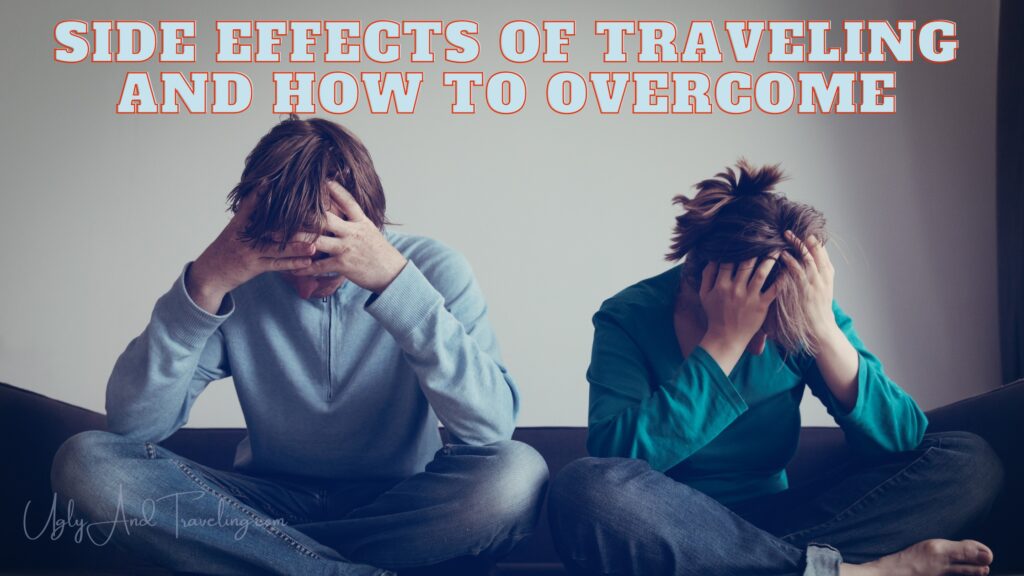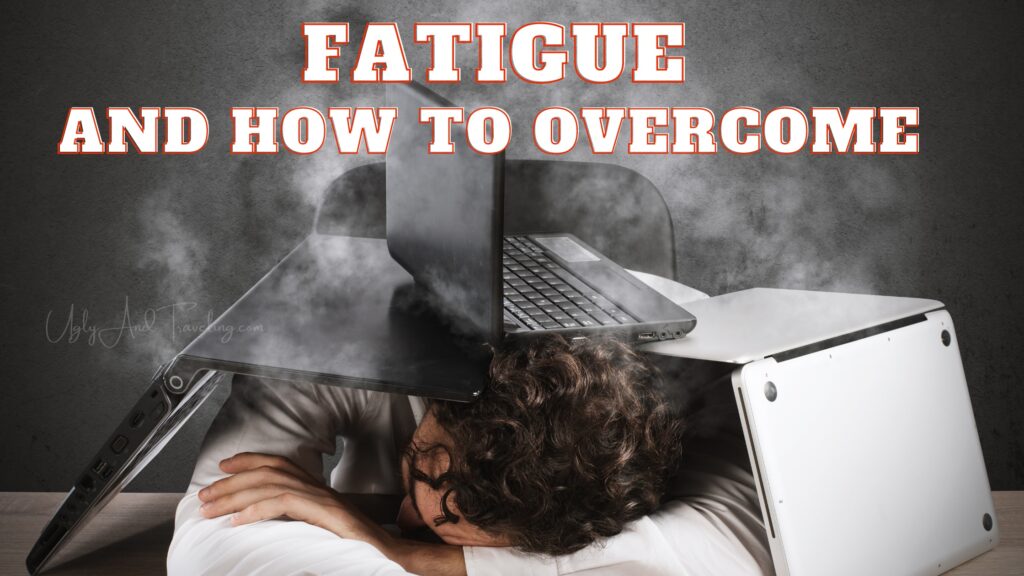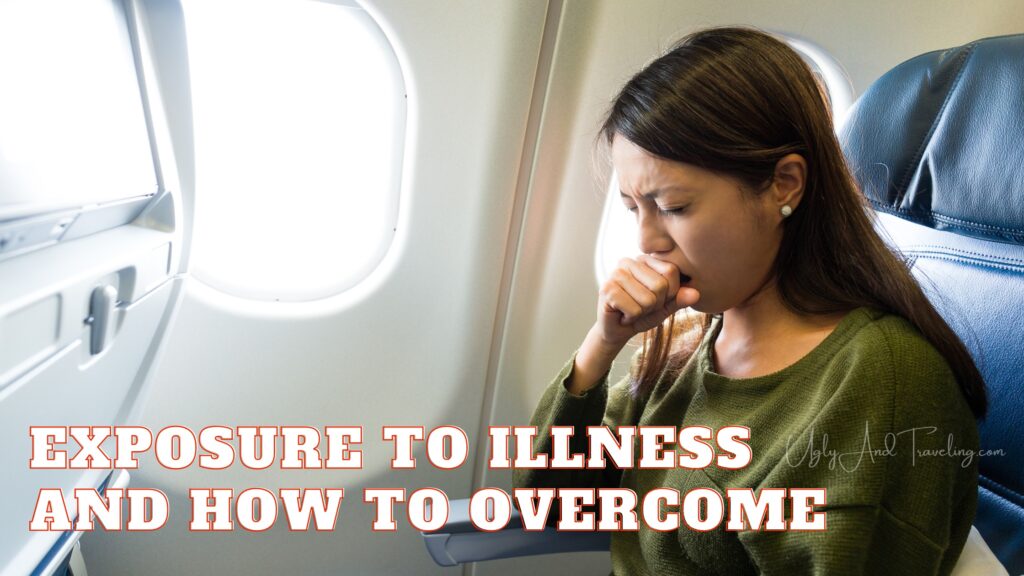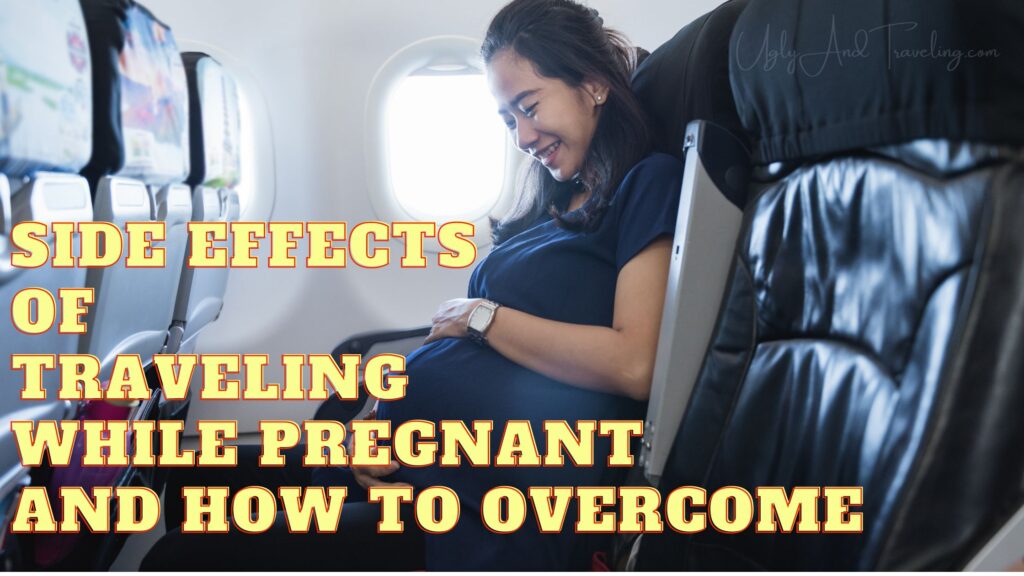There’s always a price to pay for every decision, and when it comes to traveling you must know there can be some side effects of traveling as well.
Traveling is a great way to see the world and experience different cultures. It also has some side effects that you should be aware of before you embark on your journey.

Here are a few things you might want to consider before traveling.
It is important to take care of your mental health when traveling. It is common for travelers to experience a range of side effects from jet lag to culture shock and even the flu. There are also other side effects of traveling such as sleep deprivation, dehydration, and risk of infection due to exposure to other people’s germs.
There are several potential side effects of traveling, including fatigue, jet lag, culture shock, and exposure to illness.
If you’re traveling for work or pleasure, it’s important to understand the side effects of traveling and how to overcome them. Here we’ll go over some of the most common side effects and ways to combat them. This article will explain these side effects and provide you with tips on how to prevent them during your travels.
Fatigue

Fatigue, tiredness, or weakness is a common side effect of traveling, especially if you are traveling long distances or across time zones. This is the most common side effect of traveling and it occurs when your body clock does not match your new time zone. Jet lag symptoms include insomnia, fatigue, nausea, and dizziness among others.
It is the feeling of tiredness, weariness, and lack of energy or motivation. It is a common experience during traveling. It can be caused by inadequate sleep and rest, jet lag, or other factors.
Basically, fatigue is a natural response to stress and physical or mental exertion. It is often experienced as a feeling of tiredness, lethargy, or exhaustion. Travelers are more likely to experience fatigue because they are exposed to different time zones, unfamiliar environments, and new routines.
The most common causes of fatigue during traveling are jet lag and the disruption of circadian rhythms in the body’s internal clock.
It is a condition that has been defined as “a diminished capacity for work or activity due to lack of sleep or rest”.
Fatigue during traveling can be caused by a variety of factors, such as lack of sleep, overexertion, stress, illness, or certain medications. Fatigue can also make it difficult to concentrate and think clearly. A fatigued person may feel tired, sleepy, sluggish, exhausted, or irritable.
Ways To Combat Fatigue
Fatigue is one of the most common symptoms people experience when they travel. There are some ways to combat fatigue while traveling:
Get enough sleep: Make sure you are getting enough restful sleep at night. Try to establish a regular sleep schedule and create a relaxing bedtime routine. Get enough rest before and during travel
Exercise regularly: Regular physical activity can help reduce fatigue and increase energy levels. Aim for at least 30 minutes of moderate-intensity activity, such as brisk walking, on most days of the week. And you would stay active during your travels.
Eat a healthy diet: A well-balanced diet that includes a variety of fruits, vegetables, whole grains, and proteins can help boost energy levels. Avoid skipping meals and try to eat regularly throughout the day.
Stay hydrated: Dehydration can contribute to fatigue, so it’s important to drink enough fluids throughout the day. Aim for at least 8-8 ounces of water per day.
Reduce stress: Chronic stress can lead to fatigue, so it’s important to find ways to manage stress effectively. This may include practicing relaxation techniques, such as meditation or deep breathing, or seeking support from friends and family.
Take breaks: It’s important to give yourself regular breaks throughout the day to rest and recharge. Take a few minutes to stretch, walk around, or just relax.
Consider medical causes: If you have persistent fatigue that does not improve with self-care measures, it may be worth speaking with a healthcare professional to determine if there is an underlying medical condition that needs to be treated.
Jet lag

Jet lag is another common condition that occurs when your body’s internal clock is out of sync with the local time at your destination. This can cause symptoms such as fatigue, insomnia, and digestive problems.
In simple words, jet lag is the result of a disruption in the circadian rhythm, which is the body’s sleep-wake cycle.
Some people may experience jet lag, which is a temporary condition that occurs when your body’s internal clock is out of sync with the time zone in which you are located. This can lead to fatigue and decreased productivity.
Jet lag can usually be avoided by traveling east-to-west or west-to-east and adjusting to the new time zone gradually.
It is a phenomenon that many people experience when they travel across time zones. It can affect how well you sleep and how alert you feel during the day.
Jet lag typically occurs when crossing five or more time zones, but it can also occur when crossing two or three time zones. If you travel from New York to London, for example, you will cross six time zones and will most likely experience jet lag.
A traveler’s susceptibility to jet lag depends on the number of time zones crossed, length of flight, age, and health.
Ways To Prevent Jet Lag
From reading above, by now we know jet lag is a common problem that occurs when you travel across time zones and your body’s internal clock (circadian rhythm) becomes disrupted. Here are some tips for preventing jet lag:
Adjust your sleep schedule: A few days before your trip, try to adjust your sleep schedule to match the time zone of your destination. This can help your body adapt to the new time zone more easily. And get plenty of rest before you fly.
Get plenty of sleep: Make sure you get enough sleep in the days leading up to your trip. This will help you feel rested and better able to cope with the effects of jet lag. Get more sleep before your flight and try to stay awake on your flight as much as possible.
Don’t eat too much: Eat light meals before and during travel.
Stay hydrated: Dehydration can contribute to fatigue and other symptoms of jet lag, so it’s important to drink plenty of water before and during your flight.
Think in advance: Plan ahead by knowing how much time it will take to adjust to the new time zone.
Avoid alcohol and caffeine: These substances can disrupt your sleep and make it harder for your body to adjust to the new time zone. So, avoid alcohol consumption before, during, or after your flight.
Use melatonin: Melatonin is a hormone that helps regulate sleep-wake cycles. Taking melatonin supplements may help your body adjust to the new time zone more quickly.
Use the light to your advantage: Exposure to natural light can help reset your body’s internal clock. Try to get plenty of natural light during the day at your destination, and avoid bright screens and lights in the evening.
Wear sunglasses: During your flight wear sunglasses to reduce exposure to blue light from screens or windows.
Stay awake: When you arrive at your destination, try to stay awake until bedtime at your destination’s time. Try to maintain your normal sleep routine on the plane and during your stopovers.
Get some exercise: Regular physical activity can help reduce fatigue and improve your overall well-being. Try to get some light exercise, such as walking or stretching, during the day at your destination.
Take it easy: Give yourself time to adjust to the new time zone. Avoid scheduling too many activities or making important decisions in the first few days after your arrival.
Culture Shock

Travel is one of the best things you can do for your health, but it’s not without risks. It’s a good idea to know the possible side effects before you go so that you can minimize or avoid them.
In the past, when people traveled to a new place, they would often face culture shock. This was because they were not used to the new surroundings, and it was difficult for them to adjust. But nowadays, with the help of technology, people can take their own culture with them and experience a sense of familiarity in any country.
Technology has changed the way we travel today. When we go abroad, we can bring our own culture with us thanks to apps that allow us to access our favorite TV shows or music from where ever we are in the world. This is a form of cultural immersion that was not possible before.
However, in this modern age still, many people experience culture shock when they travel to a new country. It is a normal reaction to the unfamiliarity of the environment and customs.
Culture shock is not just about experiencing new places and different cultures. It also includes dealing with language barriers, food, climate, and other factors that are culturally different from what you’re used to.
Generally, culture shock is a term that refers to the stress and anxiety that can result from being in an unfamiliar culture. The term is used most often concerning travel, but it can also be applied to other areas of life.
How To Overcome Culture Shock
There are several strategies for minimizing the impact of culture shock. One such strategy is to take time before traveling for a vacation or business trip, to learn about the country’s customs and norms. Another strategy is to keep an open mind and don’t be afraid to explore a new environment.
One way is to take a few minutes before you enter a new country to study the language and customs so that you don’t feel like you’re in a foreign land. Another way is to try and meet some locals while abroad so that they can show you around.
To prevent culture shock, you must try your best to understand the culture of the people around you. You should also try to learn about their customs and traditions so that you can better participate in their lives. This will help your stay be more enjoyable and less stressful for everyone involved.
Exposure To Illness

Traveling is one of the best ways to explore different cultures and experience new things. However, it is important to keep in mind that traveling can also expose you to illnesses that are not common in your country.
The most common illnesses that travelers are exposed to are respiratory tract infections, gastrointestinal disorders, skin diseases, and sexually transmitted diseases.
Exposure to illness is another potential side effect of traveling, especially if you are traveling to a country with a different climate or lower hygiene standards. To minimize the potential side effects of traveling, it’s important to stay hydrated, get plenty of rest, and avoid activities that could put you at risk of illness.
There are many different ways of contracting an illness while traveling such as eating contaminated food or drinking unclean water, touching insects and animals or being bitten by a mosquito carrying malaria or dengue fever, and eating uncooked food like sushi which can lead to food poisoning.
However, it is impossible to completely avoid exposure to illness while traveling because they can happen at any time without warning. It is important to be aware of the risks associated with exposure to different types of illnesses when traveling so that you can take steps to prevent
How to avoid Exposure to illness
The main reason that people get sick while traveling is that they are exposed to different environments and germs from different places. When people travel, they are more likely to come into contact with someone who might have a cold or the flu. This is because when people travel, they tend to spend more time in crowded spaces and public transportation where viruses could easily spread.
The first step is to get a good night’s sleep before the trip. This will help your immune system to be more active and fight off illness.
Next, wash your hands thoroughly before eating or drinking anything. This will remove any germs that may be on your hands and prevent you from getting sick.
The following are some ways to reduce the chances of getting sick while traveling:
– Keep your hands clean by washing them often, especially before eating and after using the restroom.
– Avoid touching your eyes, nose, or mouth.
– Avoid close contact with people who appear ill.
– Drink bottled water or boiled water only when unsure of the quality of tap water.
– Use hand sanitizer if soap and water are not available.
It is also important to drink plenty of fluids while traveling so that you don’t get dehydrated from being in a hot climate or from flying in an airplane for a long time.
Side Effects Of Traveling While Pregnant

Traveling while pregnant can be a safe and enjoyable experience, but there are some risks and considerations to keep in mind. Some potential side effects of traveling while pregnant include:
- Fatigue: Pregnancy can cause fatigue, and the added stress of traveling can make it worse. Make sure you get enough rest and take regular breaks to rest and recharge.
- Nausea and vomiting: Pregnancy-related nausea and vomiting can be exacerbated by travel. Avoid eating heavy or greasy meals and try to stay well-hydrated.
- Dehydration: Pregnant women are at higher risk of dehydration, so it’s important to drink plenty of fluids, especially when traveling.
- Deep vein thrombosis (DVT): DVT is a condition in which a blood clot forms in a vein, usually in the leg. Long periods of sitting, such as during a long flight, can increase the risk of DVT. To reduce the risk, get up and walk around periodically, do some leg stretches, and wear loose-fitting clothing.
- Altitude sickness: If you are traveling to a high altitude location, you may be at increased risk of altitude sickness, which can cause symptoms such as headache, dizziness, and shortness of breath. To reduce the risk, take it easy and avoid strenuous activities, drink plenty of fluids, and avoid alcohol.
- Motion sickness: Pregnancy can increase the risk of motion sickness, which can be triggered by travel on planes, trains, or boats. To reduce the risk, try to sit in a location with the least movement, take breaks to walk around, and avoid reading or looking at screens while traveling.
- Infections: Traveling to certain areas may expose you to infections or diseases that you would not normally be exposed to at home. Make sure you are up to date on your vaccinations and take precautions to avoid foodborne and waterborne illnesses.
It’s important to discuss your travel plans with your healthcare provider before you go to ensure that you and your baby are as safe and healthy as possible during your trip.
How To Prevent Side Effects Of Traveling While Pregnant
Here are some tips for preventing the side effects of traveling while pregnant:
- Consult with your healthcare provider: Before you travel, make sure you discuss your plans with your healthcare provider. They can advise you on any potential risks and help you make a plan to manage them.
- Get enough rest: Pregnancy can cause fatigue, and the added stress of traveling can make it worse. Make sure you get enough rest and take regular breaks to rest and recharge.
- Stay hydrated: Pregnant women are at higher risk of dehydration, so it’s important to drink plenty of fluids, especially when traveling.
- Avoid long periods of sitting: To reduce the risk of deep vein thrombosis (DVT), get up and walk around periodically, do some leg stretches, and wear loose-fitting clothing.
- Take it easy at high altitudes: If you are traveling to a high altitude location, take it easy and avoid strenuous activities. Drink plenty of fluids and avoid alcohol to reduce the risk of altitude sickness.
- Avoid triggers for motion sickness: To reduce the risk of motion sickness, try to sit in a location with the least movement, take breaks to walk around, and avoid reading or looking at screens while traveling.
- Practice good hygiene: To reduce the risk of infection, wash your hands regularly with soap and water, avoid eating undercooked or contaminated food, and avoid drinking tap water or ice in areas where the water may not be safe.
- Stay up to date on vaccinations: Make sure you are up to date on your vaccinations before you travel. This can help protect you and your baby from infections and diseases that you may be exposed to while traveling.
By following these tips, you can help reduce the risk of side effects and ensure that you have a safe and enjoyable trip while pregnant.
My closing thoughts
Traveling is one of the most exciting experiences in life. However, it does come with some side effects. These side effects can range from physical to emotional and can be quite challenging to manage. You must be aware of these side effects before you travel so that you can prepare for them accordingly.
There are many ways to avoid these side effects when traveling, but you must do your research before taking off so that you know what to expect!
If you liked this blog and it was helpful to you, then why not share it with your friends & family.
Or, if you really wanna be extra sweet, then support me by subscribing to my YouTube channel, and leaving your valuable comments under my videos.
For more travel-related information, you can subscribe to this travel blog website by simply entering your email address to get a notification upon publishing a new blog. The subscribe box you can see on the right side of this page. Also if you get an alert on your web browser while viewing my site, allow it and that will also give you an alert on your web browser whenever I publish a new blog 🙂
Traveling with the green ( ?? ) passport ?
Take only memories✈️leave only footprints?
Click here to check out my YouTube Channel and One Magic link of all my social media accounts
Stay safe & much love!❤️










